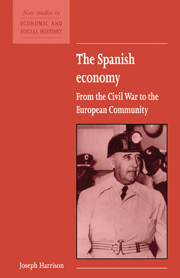Book contents
- Frontmatter
- Contents
- List of tables
- Acknowledgements
- Map of Spain
- 1 Backwardness and progress, 1900–36
- 2 An outline of economic development since the Civil War
- 3 Demographic developments
- 4 Agriculture
- 5 Industry
- 6 Energy
- 7 The service sector
- 8 Foreign trade
- 9 The financial system
- Concluding remarks
- Bibliography
- Index
- More Titles in the New Studies in Economic and Social History series
4 - Agriculture
Published online by Cambridge University Press: 05 June 2012
- Frontmatter
- Contents
- List of tables
- Acknowledgements
- Map of Spain
- 1 Backwardness and progress, 1900–36
- 2 An outline of economic development since the Civil War
- 3 Demographic developments
- 4 Agriculture
- 5 Industry
- 6 Energy
- 7 The service sector
- 8 Foreign trade
- 9 The financial system
- Concluding remarks
- Bibliography
- Index
- More Titles in the New Studies in Economic and Social History series
Summary
A decade of depression
At the cessation of hostilities in 1939, Spanish agriculture displayed few signs of the problems which were to beset it during the next decade. Several of the more prosperous farming regions, which had comprised part of the Nationalist zone, were either untouched by the conflict or sustained little damage. In Republican areas, agricultural production had shown surprising vitality. Wartime destruction of crops, animals, farm buildings and agricultural machinery was slight. Only in the cases of mules and oxen could temporary shortages be said to exist (Tió, 1982; Barciela, 1986). Yet, throughout the 1940s, the Spanish countryside was engulfed in a profound crisis.
For their part, the Francoist authorities tried to explain away declining yields and widespread hunger in terms of the damage cause by the Reds (thereby implying that the rebel army had waged war selectively), the ubiquitous ‘enduring drought’, a lack of resources to import tractors and chemical fertilisers and the activities of the maquis. Yet, as Carlos Barciela contends, the New State was partly to blame for its own adversities. Above all, he lampoons the regime's flawed interventionist ideology which naively asserted that such matters as levels of output, wages and prices could be preordained by the promulgation of decrees. Market forces were deemed to be of minor significance (Naredo, 1974; Barciela, 1986).
The regime's abiding passion for self-sufficiency in foodstuffs led to a specialisation in basic staples. In particular, interventionist schemes set out to stimulate the production of wheat and olive oil.
- Type
- Chapter
- Information
- The Spanish EconomyFrom the Civil War to the European Community, pp. 26 - 32Publisher: Cambridge University PressPrint publication year: 1995

